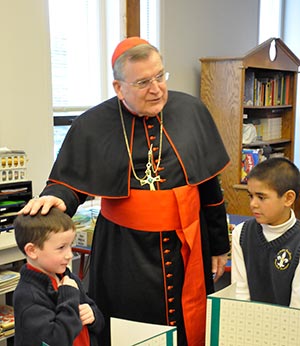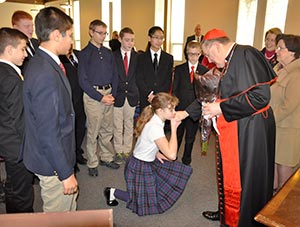Christians today find themselves in a secularized society, warned Cardinal Raymond L. Burke in a keynote address to about 300 people Thursday, Dec. 4, at the Country Springs Hotel. Even more alarming, according to the cardinal, is how deeply the secularization has entered into the life of the church. Cardinal Raymond L. Burke greets kindergartners, Jack Shanahan, left, and Thomas Ratnayake during his visit to Trinity Academy in Pewaukee on Thursday, Dec. 4. (Catholic Herald photo by John Kimpel)
Cardinal Raymond L. Burke greets kindergartners, Jack Shanahan, left, and Thomas Ratnayake during his visit to Trinity Academy in Pewaukee on Thursday, Dec. 4. (Catholic Herald photo by John Kimpel)
Cardinal Burke, a Wisconsin native and contributor to the Synod of Bishops held at the Vatican, Oct. 5 to 19, discussed “Education: Irreplaceable Way of Cultural Transformation,” at a fundraiser for Trinity Academy, a K4-12 independent Catholic school that stresses tradition in academics and the church.
The response to the increasing secularization of the church and society, according to Cardinal Burke, lies in education that has begun in the home and is furthered through Catholic schooling.
“Education which takes place first in the home and is enriched and supplemented by truly Catholic schools is directed fundamentally to the formation of good citizens and good members of the church,” he said, referring to Pope Pius XI who spoke of the formation of “true, great Christians.”
The central work of a Catholic school is instructing students in the right balance between faith and reason and “makes the Catholic school an efficacious agent of the transformation of culture,” he said.
Cardinal Burke’s presentation in Pewaukee came a few weeks after he was reassigned by Pope Francis to serve a largely ceremonial post as cardinal patron of the Knights and Dames of Malta. Prior to that, since 2008, he had served as Prefect of the Supreme Tribunal of the Apostolic Signatura in Rome, and as such was the highest ranking American cardinal at the Vatican.
In December 2013, Pope Francis did not reappoint Cardinal Burke to his position on the Congregation for Bishops, which advises the pope on episcopal appointments. Ann Marie Gross, kneeling, fellow Trinity Academy students greet Cardinal Raymond L. Burke, following a morning assembly at the Pewaukee school on Thursday, Dec. 4. (Catholic Herald photo by John Kimpel)
Ann Marie Gross, kneeling, fellow Trinity Academy students greet Cardinal Raymond L. Burke, following a morning assembly at the Pewaukee school on Thursday, Dec. 4. (Catholic Herald photo by John Kimpel)
While Pope Francis has not given reasons for the changes, Cardinal Burke has appeared increasingly out of step with his pontificate through his defense of doctrine on controversial moral issues.
During the recent synod, he was one of the most vocal critics of a midterm report that used conciliatory language toward people living lives contrary to Catholic teaching, including those in same-sex unions. He has also been concerned that efforts to streamline the marriage annulment process will undermine its rigor.
While he did not address the move directly, he addressed several of the controversial issues throughout his talk. When he was introduced prior to dinner, Elizabeth Mitchell, director of development at Trinity Academy noted, “We’re all here for one reason and that’s to honor the heart of Cardinal Raymond Burke.” Her statement was met with an extended standing ovation for the cardinal.
During his presentation, the cardinal stressed that the church is impelled to devote herself to safeguarding and fostering the truth of married life, and said, “In our Christian witness and apostolate, we must give special attention to the sanctity of marriage and to the fidelity, indissolubility and procreativity of the marital union.”
He also expressed concern that human sexuality is no longer seen as a gift from God which draws a man and woman together, but rather is a tool for personal gratification.
He pointed to the devastation wrought daily in the world by the multimillion dollar industry of pornography “or the incredibly aggressive homosexual agenda which can only result in the profound unhappiness and even despair of those affected by it and the destruction of society as it has always done historically.”
According to the cardinal, restoration of respect for the integrity of the conjugal act is essential to the future of Western culture, the advancement of a culture of life.
He was equally direct about the existence of same-sex unions.
“Today we sadly find the need to speak of traditional marriage, as if there were another kind of marriage. There is only one kind of marriage as God has given to us at creation and as Christ has redeemed it by his saving passion and death,” he said.
The notion of tolerance, which leads to thinking and acting contrary to moral law, seems to be the interpretative key for many Christians, said Cardinal Burke.
“According to this approach, one can no longer distinguish between the beautiful and the ugly, the true and the false and the good and the evil,” he said, adding this approach is not grounded in moral tradition, “but tends to dominate our approach to the extent that we claim to be Christian while tolerating ways of thinking and acting which are diametrically opposed to the moral law revealed to us in nature and the sacred Scriptures.”
This thinking, said the cardinal, leads to a “spiritual seasickness, a disorientation which I myself have felt and I’m sure perhaps you have encountered, too, in our culture. Certain actions cannot be at the same time both true to moral law and not true to it.”
The response, said Cardinal Burke, must be charity, “unconditional love of the person who is involved in the evil, but firm abhorrence of the evil to which the person has fallen.”
All education must be directed to forming students in charity with a proper understanding of conscience.
“Today one must be attentive to a false notion of conscience used to justify sinful acts,” he noted.
Ultimately, he said, education should be directed to the happiness of the individual, which is found in right relationships and has its fulfillment in eternal life.
“It presupposes the objective nature of things to which the human heart is directed, if it is trained to be a ‘listening heart.’ It seeks an ever deeper knowledge and love of the true, the good, and the beautiful. It forms the individual to this fundamental pursuit throughout his or her lifetime,” said the cardinal.
In closing, he asked his audience to pray for him “in this mission which is mine.”
